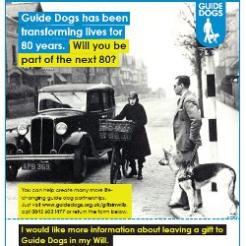Guide Dogs increased its fundraising income by 8 per cent to £71.4m last year, but spent more than £31.2m generating it – a rise in its fundraising costs of nearly 28 per cent.
The disability charity recorded total income of £74.9m for the year to 31 December 2013, up from £69.1m in 2012. However, it spent a lot more than it earned: total expenditure was £85.3m, and it was the sixth consecutive year that it has run at a deficit.
The charity’s annual report states that 2013 was a “very successful year” during which the organisation expanded and developed new services and enabled hundreds more people with sight loss to take control of their lives again.
Highlights included:
- The National Breeding Centre exceeded targets for litter sizes, conception rates and breeding bitch numbers
- The number of guide dogs partnered with people increased by 46 to 4,798
- The charity acquired Blind Children UK and launched a new children’s strategy
- The buddy dog service grew by more than 50 per cent
- Sponsor a Puppy donors exceeded 100,000 for the first time
Campaigning successes included government commitments on microchipping of all dogs, mandatory fitting of noisemakers to electric vehicles, and the criminalisation of attacks on assistance dogs.
The charity justified its year-end deficit by explaining that it “results from planned investment in fundraising and service delivery growth and is in line with our plans for the future”.
“Our income growth plans continue to bear fruit and this, along with close control over obtaining value for money from the resources we expend means that we are on track to bringing the organisation to a more robust financial position.”
The report also said that the bigger spend on fundraising of £6.8m would deliver return in future years.
It concluded that the board’s overall aim is to at least break even, but trustees recognise that “in times of service expansion or general economic recession this may not always be achieved”.
The charity increased the number of full-time equivalent staff it employs, from 1,118 to 1,158 and the number of staff earning over £60,000 rose from 12 to 17. CEO Richard Leaman accepted a pay rise within £10,000 bands for the third successive year, increasing his salary to a maximum of £130,000.
Free reserves dipped again from £45.1m at the end of 2012 to £40.5m, and remains below the target level of one to two years' operating costs. Overall funds also decreased, by £6.6m to £87.5m.
Guide Dogs declined to comment further on the report.









